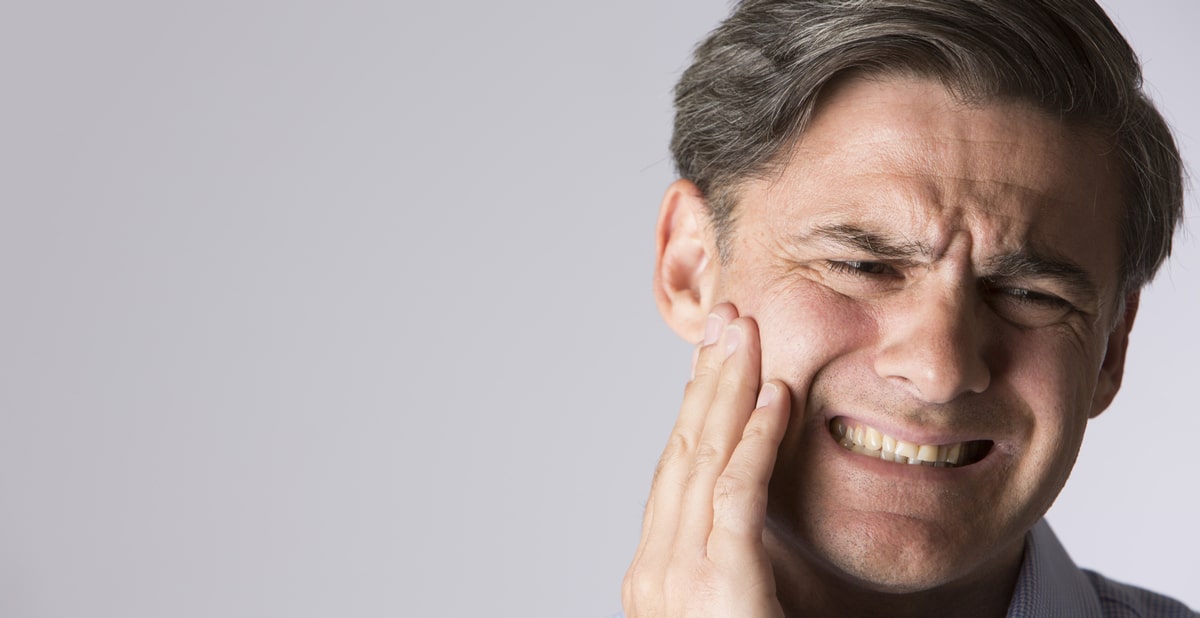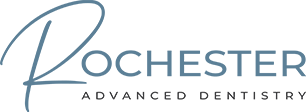Jaw pain is one of the most common symptoms of TMJ, but that doesn’t mean everyone feels the same pain. Many people experience tense jaw muscles that cause a dull, throbbing pain. Other times, sharp, stabbing pain in the joint is felt. Pain related to pinched nerves can have a shocking quality, or it might even feel like tingling or numbness. If you have recurring jaw pain, though, it is likely related to TMJ.
If you are looking for treatment of TMJ to relieve symptoms of jaw pain in Rochester, MI, please call (248) 656-2020 for an appointment with a TMJ dentist at Rochester Advanced Dentistry.

Home Remedies for Jaw Pain
Many cases of pain are transient and related to a single instance of minor jaw problems. There’s no need to call a doctor or dentist: this jaw pain will resolve on its own with just minor attention from you.
There are many things you might be doing that contribute to your jaw pain. Overexertion is one of the most common causes of minor jaw pain, so start by taking it easy. If you tend to talk a lot, try talking a little less for a while. If your job depends on you talking, especially talking loud to large groups of people, maybe you should take some time off. Try to avoid activities that overextend your jaw, such as yawning wide, or taking big bites out of large foods such as thick sandwiches, burgers, or burritos.
Also, avoid foods that make you chew a lot. This includes gum, but also tough meats and hard or tough candies. Fortunately, there are many tasty, nutritious foods that you can eat for a few days to let your jaw relax.
For many people, jaw clenching is the source of jaw pain, and clenching is related to stress. Learn relaxation techniques that can help you avoid stress-related clenching. If you are having difficulty relaxing on your own, there are programs that can help you achieve relaxation.
Heat applied to the jaw can significantly reduce muscle soreness. If your muscles are sore from overactivity, applying moist heat can speed the resolution. If, on the other hand, you experienced jaw trauma, and swelling is responsible for some of the pain, apply cold instead.
Over-the-counter pain medications are also appropriate for treatment. Nonsteroidal anti-inflammatory drugs (NSAIDs) like ibuprofen or naproxen can help reduce swelling as well as combat pain. Always follow the directions on the label and never exceed recommended dosages.
When to Seek Professional Care
Under some circumstances, home care can be bad for your jaw. It’s important to watch out for warning signs that you need professional care. These include:
- Pain that goes away and comes back
- Pain that lasts over seven days
- Pain that doesn’t respond to over-the-counter medication
- Inability to sleep because of intense pain
- Increasing pain under home care
- Limited jaw movement or locked jaw
- Grinding noise in the jaw joint
These symptoms indicate that you likely have a serious problem that needs the attention of a TMJ dentist. TMJ diagnosis will tell you the cause of your jaw pain.
Types of TMJ Pain
As we noted above, there are several types that are associated with TMJ. This includes:
- Muscle pain
- Joint pain
- Nerve Pain
Muscle pain is the most common type of jaw pain associated with TMJ. It relates to tense, overworked muscles that become sore. Sometimes these muscles are tense because of overwork: too much chewing, talking, or clenching and grinding (bruxism). Other times, your muscles get tense because your jaw cannot find a neutral rest position. This means that your muscles are always working, even when you think they’re at rest.
Joint pain occurs when the temporomandibular joint or joints are damaged. The pain may come from an inflamed disc that is supposed to cushion the joint or from the bones that are grinding because they aren’t being cushioned properly.
Nerve pain occurs when an out-of-place jaw puts pressure on a nerve. This type of pain may have an electric, stinging quality, or it may register as tingling or numbness. It may even be interpreted as other sensations, such as sound from the ear (tinnitus).
Most types of jaw pain respond to TMJ treatment, please call (248) 656-2020 for an appointment with a TMJ dentist at Rochester Advanced Dentistry.

